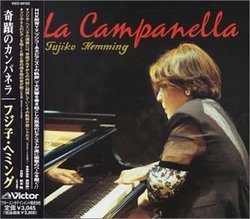Bernstein's Serendipity
Youko Yumoto | New York, NY USA | 12/12/2000
(5 out of 5 stars)
"Ingrid Fujiko v. Georgii-Hemming was born in Berlin. Her mother, Toako Otsuki, was a Japanese pianist and studied in Germany at that time. Her father, Josta Georgii-Hemming, was a Russian Swedish architect. She and her mother went back to Japan right before the Nazis gained power. It was when she was five years old. However, it was the time when Japan also rushed into World War II. Her father went back to his home country (Sweden) leaving Hemming and her mother behind. She never saw him again. She began piano lessons with her mother at the age of five. Leonid Kreutzer, a Russian born German pianist (he was one of her father's friends), became her piano teacher when she was ten years old. Listening to her piano performance, he jumped in excitement and said, "Fabulous, this is a genius!" She later said, "I heard many people saying, "You will be a star, soon". I thought that it ought to be so but it would not be so. One designer said to me, "You will become famous shortly." I was surprised because he usually did not have warmth. Why. Why me? I used to think so, but it came true" (Ikeda 107). In February 1999, she became famous out of the blue in Japan because her turbulent life was featured on TV program. Even before that, she was on radio as a child prodigy at the age of nine. When she was seventeen, she achieved a concert debut. She graduated from Tokyo National University of Fine Art and Music, and went abroad (to Berlin, then to Vienna) to study the piano. Major newspapers in Germany reported her performance already in 1968 that there appeared a pianist from Japan and described her as a pianist who was born to play Chopin and Liszt. However, she did not take part in the concert in Eastern Europe, which people regard as an opening gate to honors for new pianists. The reason for this was she lost Swedish nationality when she was eighteen years old because she had never lived in Sweden. Since then she was stateless; she studied piano in Berlin as a refugee. She said, "When people mention "Japanese pianists" my name is not among those. When they talk about "Swedish pianists" my name is not among those, either. Wherever I go, everyone pushes me aside as an outcast. Somebody once said to me, "To win fame, you need talent, the country behind your back, and money. Even if one of them is lacking, you cannot make it". What I have is only one, talent" (Ikeda 106). Nonetheless, the talent that is supposed to be found is eventually found. In 1971, she realized her dream of having a recital in Vienna by one word of Leonard Bernstein. She still has a black-and-white photograph in which her name was on the advertising pillar in Vienna. Right before the recital, she had a high fever and lost the entire audition, which she once determined to terminate her career as a professional pianist. She still cannot hear with the right ear at all. She went to her father's country and 40 % of hearing with her left ear was back. There she also regained Swedish nationality. That was when she was forty years old. Since then, she started her musical performance again. Having heard from her mother's death, she returned to Japan in 1995, which meant that she had to leave Europe where she had spent for more than three decades. "I felt regretful to come back to Japan. My heart remained in Europe. God did such a thing to me again as expelling me out of where I long belonged. Although I was wondering why", now she understands. "There is a phrase in Bible, "Wait, it shall come ["Though it lingers, wait for it; it will certainly come and will not delay (Hab. 2:3, 4)]". I thought that it would come to me after I go to Heaven. It came to Schubert or Mozart after they died, didn't it? In my case, it just came earlier" (Ikeda 107). Her debut CD "La Campanella" released on August 25 in 1999 gave rise to 300,000 unit sales within the first three months. After that, the sky is the limit; all the tickets are sold out wherever and whenever she has a concert. Bernstein's word proved right after no less than 28 years especially among the laymen about music in Japan. Here, in the U.S.A., she is still unknown! It is a shame that I am the first person who writes a review of this beautiful piece;but, I am, herewith, proudly recommending this CD to you: "La Campanella". Works Cited Ikeda, Yoko. "The Story about a Self 179". Croissant 25 Jan. 2000: 105-108For more information about her, visit the following homepages:For those of you who speak Japanese: Kaneda, Masahiro. "Ingrid Fujiko v.Georgii Hemming" 10 Dec. 2000 For those of you who speak English: Victor Entertainment. "Ingrid Fujiko V. Georgii-Hemming" 10 Dec. 2000 "
Fujiko Hemming-la campanella
Charles Plummer | Florida | 01/04/2006
(5 out of 5 stars)
"I own CDs of over 100 pianists. Almost all play Chopin. I always considered Ruth Slenczynska and Ivan Moravec the only ones who really understod the music. Make room for Hemming as number one! Her Waltzes and Mazurkas sound like the dance music that they are supposed to be. Her piano sings!"


 Track Listings (10) - Disc #1
Track Listings (10) - Disc #1